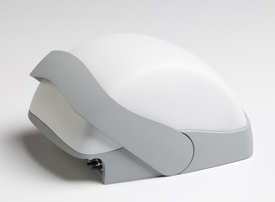A small-business router from Ruckus that delivers range and reliability

Ruckus Wireless is best known for its work with overseas phone companies to develop technology to stream digital TV over standard Wi-Fi. But it also builds powerful—let’s call them prosumer--routers and access points for small businesses. And the company has just launched its first 802.11n router.
The $699 ZoneFlex 7942 delivers extended range as well as better signal control, enabling it to dodge signal interference in real time. It’s designed to fit the space between consumer routers and expensive enterprise-class devices. If you’re looking for a less pricey model, consider the $349 ZoneFlex 2942, an 802.11g MIMO router.
Range and reliability are the company’s hallmarks, says David Callisch, vice president of marketing for Ruckus. The secret lies in its proprietary smart antenna technology: The ZoneFlex 7942 includes a smart antenna array that integrates six high-gain vertically polarized and six horizontally polarized antenna elements. The device’s software selects the best antenna for any given client, and its QoS enables you to optimize performance for certain clients like VoIP. This provides up to 7dBi gain that reportedly delivers a range of up to 10,000 square feet. (I’m hoping to test this myself, because I’ve never gotten anywhere near that range with a consumer router.)
Callisch says Ruckus installations typically require about half the number of access points because of its smart antenna technology. And he says Ruckus guarantees at least 20Mbps of predictable performance within a 5,000- to 10,000-square-foot facility. That 20Mbps, he says, is the worst-case scenario for an 802.11g network because you’ll never get the rated speed of 54Mbps. “We make the worse case suck less, because you’ll never get less than 20Mbps,” he says.”
Callisch says Ruckus targets small businesses that range from a 10-person mom-and-pop shop to a company of up to 750 employees. The biggest demand among small businesses is a more reliable and robust signal, both in range and consistency. “People want their laptop to have the same five bars that their phones do,” he says. Callisch says many customers are willing to pay more for a reliable signal and predictable range.
